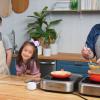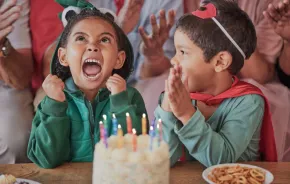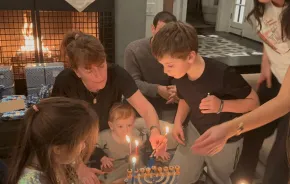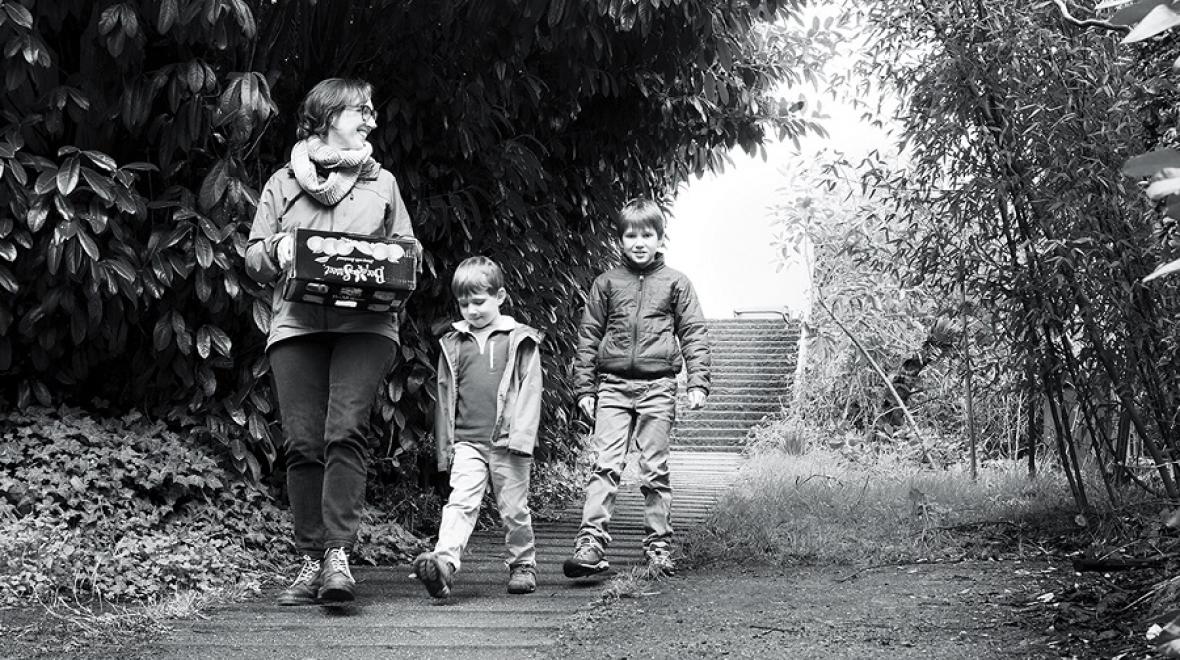
Photo:
Caroline Wright and her two sons deliver soup to Soup Club members; photo by Joshua Huston
Caroline Wright, a mother of two young boys and a busy and accomplished culinary professional, was juggling far too much already when she received a devastating phone call from her internist in 2017 that utterly upended her life. A scan had confirmed that the headaches she had been experiencing were not migraines after all, but the symptoms of a rapidly growing, malignant brain tumor.
Back at home following a swiftly scheduled surgery to remove the tumor and reeling from a diagnosis of terminal cancer, Wright did what most parents with young children do in such a life-and-death crisis: She summoned her mother courage and grasped back creatively and lovingly at life. Given a year to live, she decided to start a blog on the CaringBridge website, both to remain connected with her many friends and family members across the country and abroad, but also to document a legacy of stories for her husband and sons.
“I started writing from a place of wanting to inform them of who their mother was — not just [about the] cancer — but so that they knew the shape of my fighting in case I lost, and also so that they knew who their mother was,” she recalls. As an outgrowth of her meditations, Wright self-published “Lasting Love,” a preciously illustrated picture-book intended to help children like hers to navigate the experience and fear of losing a loved one to terminal illness.
In parallel, a wave of love and support surged in response to Wright’s beautifully written blog. Concerned friends and readers well beyond the circle of her personal community reached out with appeals to help. “[I thought,] what is something I can tell them? I didn’t want to eat packaged food. I didn’t really want to eat a lot of takeout, either. Maybe people have a homemade soup recipe in their back pocket that they make for their family. So, that was the answer: soup.”
Wright’s husband Garth plopped a cooler out on their doorstep, and every day for months, it was filled with jars of nourishing meals for Caroline. She got better, stronger — she defied the daunting odds and prognostications of her dire diagnosis.
As Wright passed the milestone of the year’s lease on life she’d been handed, she considered her prospects and came to a decision. “I arrived at my year and I thought, ‘Crap, what do I want to do with my time, now that I know how precious it is?’ And I decided: I want to make soup for the people who made soup for me. That’s the only thing that makes sense right now.”
Motivated by deep gratitude and a mission, Wright launched a weekly “soup club,” delivering batches of her own original scrumptious soup recipes to the lucky porches of the friends who aided in her recovery. Word of Soup Club and her inspiring story of community-aided healing spread quickly.
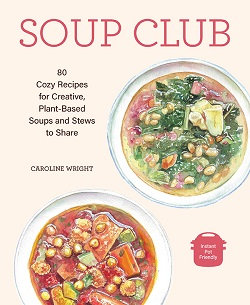 Now, more than four years after her glioblastoma diagnosis and treatment, Wright, who already has a number of gorgeous cookbook titles to her credit, has captured her story in a new cookbook that pairs a collection of 80 unique and healthful plant-based recipes with illustration, photography and poetry from her Soup Club members, collaborators and admirers. These recipes for good health and mementos articulate a brave survival story that demonstrates the power of food, love and community to heal.
Now, more than four years after her glioblastoma diagnosis and treatment, Wright, who already has a number of gorgeous cookbook titles to her credit, has captured her story in a new cookbook that pairs a collection of 80 unique and healthful plant-based recipes with illustration, photography and poetry from her Soup Club members, collaborators and admirers. These recipes for good health and mementos articulate a brave survival story that demonstrates the power of food, love and community to heal.
Wright would tell you that the secret of happiness is taking everything with a grain of salt — especially the predictions made by doctors and meteorologists. We are here including an excerpt of a touching essay of hers we published in ParentMap in 2018, one year after her diagnosis.
I’ve always described my kind of mothering as a willingness to “turn myself inside out” for my kids. I mean this as a metaphor for intimacy, openness and commitment, but my diagnosis put it to the test.
Being present after a terminal diagnosis is challenging. It’s more comfortable to slide into self-pity, to disconnect from life.
But to step aside was, I knew, to disappear too early from life. “If I have a year to live, do I want my kids to see me dying in front of them or truly living as the mother they recognize?” I asked myself. So, I continued.
For me, mothering from a place of terminal illness meant living honestly in two different worlds — one of hope that looked for strength and encouragement everywhere, and another of confronting the reality of certain death. I insisted that I had to live hoping — no, fighting — for the best possible outcome, but I also had to make plans to care for my children in case luck wasn’t on my side. So, I wrote and made things for them.
I imagined them as boys who I might not get to meet, older boys with questions about a mother whose touch had long since been forgotten. I wrote them a memoir that answered questions that I imagined they would have. I made videos filled with advice on an array of topics. I assembled a trunk of keepsakes and letters, tagged with little notes that hinted at their meaning.
I turned myself inside out, then scattered and preserved the contents as best as I could for them.
Being a mother diagnosed with terminal illness is exactly that: being a mother, with a terminal illness. For me, the mother part came first and gave me a place to go outside of myself when a weak part of me wanted to fold inward. The terminal illness part rooted me in the importance of being present and grateful for the small, daily acts of parenting while holding my hands out for more.
Now, years later, I am so grateful for these two worlds I live in. Instead of being opposed to one another, they enhance each other. I am present. I am here for them, quite literally. I exist because I am their mother — and I mother them because I exist.
I am lucky and I will turn myself inside out for them as long as I can.
Without social media, Caroline keeps in touch with her readers with a monthly newsletter. Sign up at her website.







